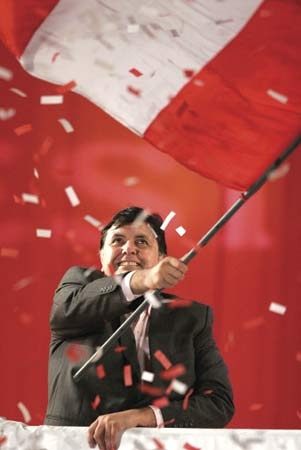García, Alan
president of Peru
in full Alan García Pérez
born May 23, 1949, Lima, Peru
 Peruvian politician who served as president of Peru (1985–90; 2006– ).
Peruvian politician who served as president of Peru (1985–90; 2006– ).García studied at Pontifical Catholic University in Lima and earned a law degree (1971) from the Main National University of San Marcos of Lima. After several years of additional study in Madrid and Paris, he returned to Peru, where in 1976 he joined the centre-left American Popular Revolutionary Alliance (APRA). Remarkably gifted as a public speaker and highly charismatic, García enjoyed rapid success as a politician, being elected to Congress in 1980. He ran successfully for president in 1985, and at 36 years of age—widely touted as “Peru's JFK (Kennedy, John F.)”—he entered office as the country's youngest-ever president.
García's presidency soon turned disastrous, however. His decisions to nationalize the banking industry and to suspend the country's foreign-debt payments helped plunge Peru into economic ruin. Inflation skyrocketed to 7,500 percent, there were shortages of basic foodstuffs, and some five million Peruvians joined the ranks of the impoverished. Meanwhile, the Maoist rebel group Shining Path (Sendero Luminoso) stepped up its attacks. García left office in disgrace and, under the threat of arrest on corruption charges, fled to France in 1992. Despite his exile, he retained strong support within APRA, and in 2001, after the statute of limitations had run out on the charges against him, he returned to Peru to lead the party. He ran for president that year but lost to Alejandro Toledo.
After the election, García continued to build support with two important groups: women, who he vowed would be an important presence in his cabinet, and young people, some of whom did not recall his previous term as president. Heading into the first round of voting in the 2006 election, most polls showed García trailing one-time military coup leader Ollanta Humala and conservative former congresswoman Lourdes Flores. Although Humala—a political neophyte openly backed by Venezuelan Pres. Hugo Chávez (Chávez, Hugo)—won the first round, he failed to gain the 50 percent support needed to avoid a runoff with García, who edged out Flores by a mere half a percentage point to advance. In the ensuing weeks García picked up momentum in the polls as he repeatedly lambasted Chávez's involvement in Peruvian politics. Many voters who had earlier supported Flores found themselves reluctantly casting a ballot for García. During the campaign García was frank in acknowledging his past mistakes but insisted that he had learned from them.
In the runoff on June 4, 2006, García defeated Humala, winning nearly 53 percent of the vote. He formally took office on July 28, and the early days of his administration were dominated by the continuation of his war of words with Chávez. The two peacefully resolved their differences at a summit of South American countries in December 2006. In 2007 García visited the United States to promote the approval of a free trade agreement with Peru. His success in this endeavour, paired with low inflation and solid economic growth, marked a dramatic reverse of the fiscal and political disasters of his first term.
- Irving Langmuir
- Irving Layton
- Irving Penn
- Irving Robert Kaufman
- Irving, Sir Henry
- Irving Stone
- Irving Thalberg
- Irvington
- Irving, Washington
- Irving Wightman Colburn
- Irvin McDowell
- Irvin S Cobb
- Irwin, Elisabeth Antoinette
- Irwin, James B.
- Irwin, May
- Irwin Rose
- Irwin Shaw
- Irwin, Steve
- Irzykowski, Karol
- Iráklion
- I Rákóczi, Ferenc
- I Rákóczi, György
- Irāqīʿ
- Isaac
- Isaac Albalag